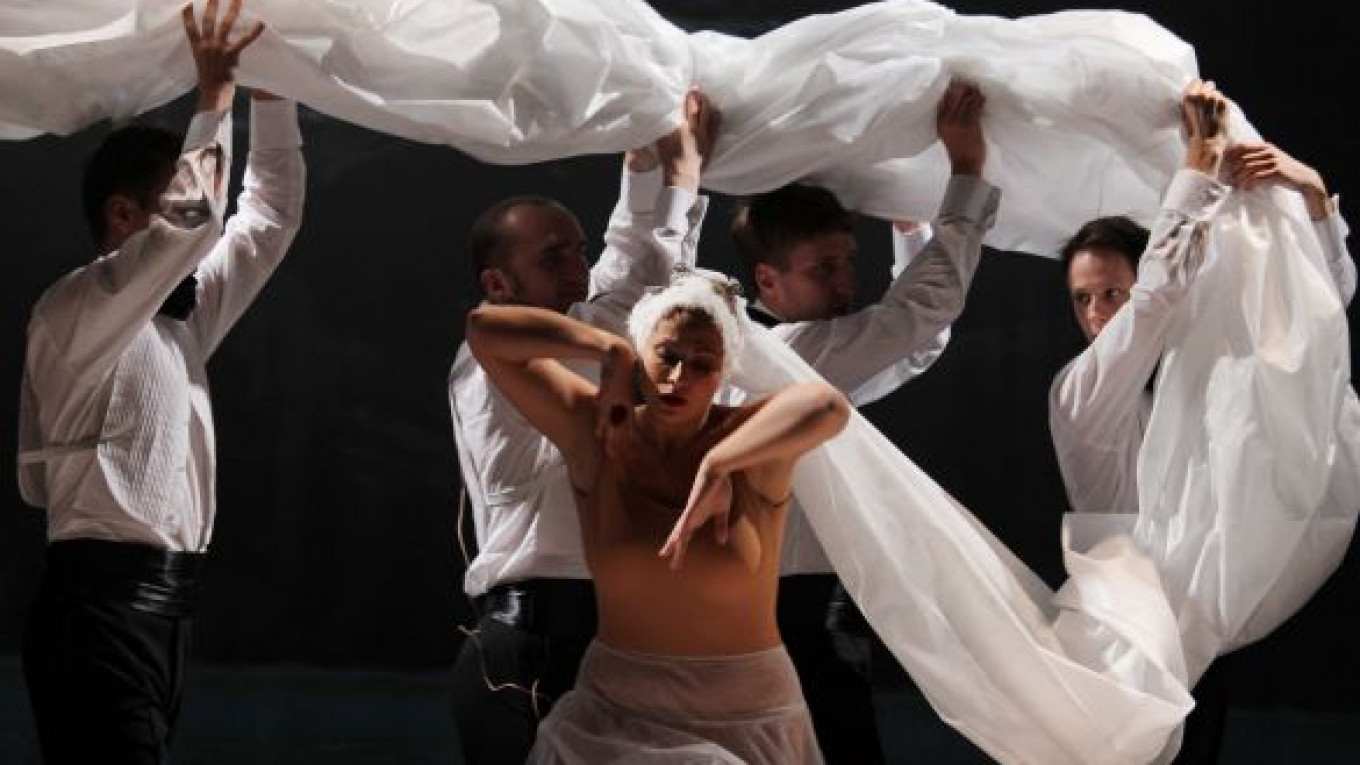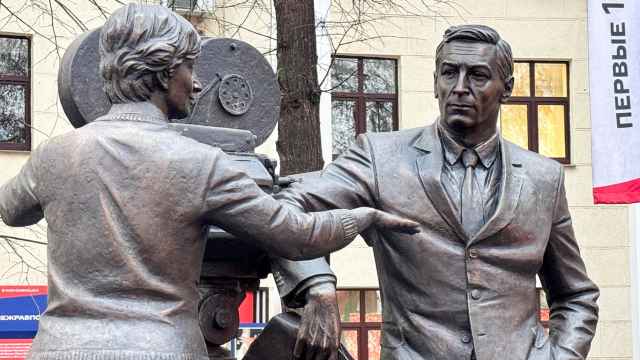The Satirikon Theater is back in a groove. This house is always a guarantee of quality, but it does occasionally slip into safer fare — albeit extremely well done. That’s not the mood there these days, however.
After last season’s stunning “Seagull,” Konstantin Raikin’s playhouse has come back with another show that knocks you out of your seat — a bracing, exhilarating piece called “Pushkin’s Little Tragedies.”
As directed by Viktor Ryzhakov, this is Pushkin as you never imagined him. A bit of jazz, a bit of pop, flamenco, Balkan wedding music, and the energy meter usually cranked to 11 on a scale of 10.
It may be exaggerating to say Ryzhakov shuffled excerpts of scenes from five Pushkin works like cards, but that is often the prevailing impression. A scene begins that you think is out of one of the famous short plays known as the “Little Tragedies” until you realize it is from another entirely.
Twice toward the end of the production I thought we were encountering the famous scene from “The Stone Guest” of Don Guan (as Pushkin rendered Don Juan’s name) confronting the statue of a rival he murdered. Both times I found myself witnessing scenes from other works — Salieri expounding upon the nature of envy from “Mozart and Salieri” and the final scene in “The Miserly Knight,” in which a rich old man kills his son without thinking.
The bold interchanging of scenes — including “A Scene From Faust” — not only gives Pushkin’s dramatic texts a sense of renewed purpose, it reveals unexpected similarities and echoes among them.
Still, all of that would be little more than an intellectual exercise were it not for that one quality that the Satirikon invariably provides — powerful, convincing acting. I often hear all kinds of nonsense from very smart people about the decline of Russian acting and the crisis of the Russian acting school. Baloney. Witness Exhibit A: “Pushkin’s Little Tragedies.”
This piece is largely an ensemble work. Raikin himself plays a prominent role, taking on snippets of Mozart and the Miser. But just as often he is absent or plays a compelling, silent and motionless spectator of the goings-on. I might add that some of his silent stares incorporating confusion, fear, stubbornness and curiosity are now burned in my memory.
The engine of this show, however, is the young cast. Seventeen actors, most of them nameless. All, however, working together as a single unit. Six men-in-waiting carry Donna Anna’s train. Six Donna Annas pace across the stage. This creates a sense of rhythm. It changes our perception of space. And, no small thing, it looks fabulous.
Two actors, however, do stand out from the crowd.
Anton Kuznetsov is a hell-bent-for-leather Don Guan who first appears in the guise of a gladiator fighting a losing battle against his servant Leporello. Kuznetsov cuts a crude figure, loud, embarrassing and uncouth. He rarely does less than shout his lines, veins popping out in his neck. And yet no utterance, no gesture is anything less than totally controlled mayhem.
The counterpoint to Kuznetsov is Odin Biron, an American who studied under Raikin at the Moscow Art Theater school and is now a company member at the Satirikon. Biron’s take on Salieri — the composer who, in Pushkin’s interpretation, envied Mozart so much he could kill him — is exquisite in its delicacy and subtle derangement. In one show-stopping moment Biron sings Mozart’s “Requiem” a cappella in a weird and moving mix of styles that includes legitimate opera, heavy metal and unbearable Justin Bieber pop.
“Pushkin’s Little Tragedies” is not a straight narrative, and it is not bound by an easily definable plot. Rather it is a visually stunning melange of scenes about jealousy, covetousness, aggression, desire, greed and other everyday human traits.
Dmitry Razumov’s set design incorporates three separate stages that are purposefully overwhelmed by a series of kinetic video installations by Vladimir Gusev. The video projections provide ominous black and orange urban images in constant motion. In one murderous scene, perhaps inspired by “A Feast in the Time of Plague,” a stageful of actors goes on a killing spree that is echoed in delayed slow motion on the central screen where cartoonish splatters of blood have maximum visual impact.
There are few things as sweet as Konstantin Raikin’s Satirikon Theater taking chances. This show may baffle you at times, but it will also throttle you. If you’re up to the challenge, the Satirikon is up to the task.
“Pushkin’s Little Tragedies” (Malenkiye Tragedii Pushkina) plays Thursday, Tuesday, Nov. 15 and 27 at 7 p.m. at the Satirikon Theater, located at 8 Sheremetyevskaya Ulitsa. Metro Marina Roshcha. Tel. 689-7844, . Running time: 2 hours, 15 minutes.
A Message from The Moscow Times:
Dear readers,
We are facing unprecedented challenges. Russia's Prosecutor General's Office has designated The Moscow Times as an "undesirable" organization, criminalizing our work and putting our staff at risk of prosecution. This follows our earlier unjust labeling as a "foreign agent."
These actions are direct attempts to silence independent journalism in Russia. The authorities claim our work "discredits the decisions of the Russian leadership." We see things differently: we strive to provide accurate, unbiased reporting on Russia.
We, the journalists of The Moscow Times, refuse to be silenced. But to continue our work, we need your help.
Your support, no matter how small, makes a world of difference. If you can, please support us monthly starting from just $2. It's quick to set up, and every contribution makes a significant impact.
By supporting The Moscow Times, you're defending open, independent journalism in the face of repression. Thank you for standing with us.
Remind me later.







